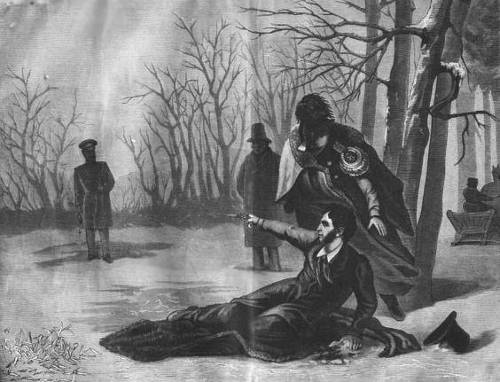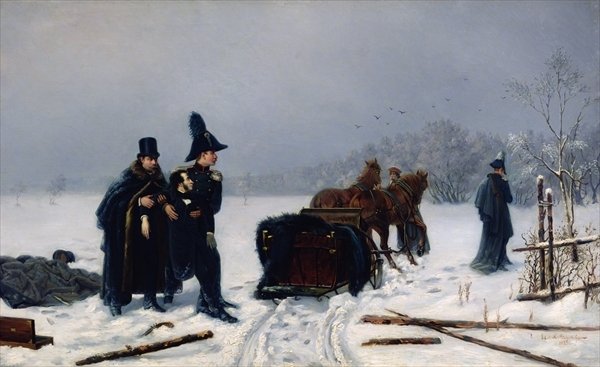Works of Alexander Pushkin (116 page)
Read Works of Alexander Pushkin Online
Authors: Alexander Pushkin

“Whether I roam along the noisy streets,
Whether I enter the peopled temple,
Or whether I sit by thoughtless youth,
My thoughts haunt me everywhere.
“I say, swiftly go the years by:
However great our number now,
Must all descend the eternal vaults, —
Already struck has some one’s hour.
“And if I gaze upon the lonely oak,
I think: The patriarch of the woods
Will survive my passing age
As he survived my father’s age.
“And if a tender babe I fondle,
Already I mutter, Fare thee well!
I yield my place to thee;
For me ‘tis time to decay, to bloom for thee.
“Thus every day, every year,
With death I join my thought
Of coming death the day,
Seeking among them to divine
“Where will Fortune send me death, —
In battle, in my wanderings, or on the waves?
Or shall the neighboring valley
Receive my chilled dust?
“But though the unfeeling body
Can equally moulder everywhere,
I, still, my birthland nigh,
Would have my body lie.
“Let near the entrance to my grave
Cheerful youth be engaged in play,
And let indifferent creation
Shine there with beauty eternally.”
21. Once passed through its mumps and measles, the soul of the poet now becomes conscious of its heavenly gift, and begins to have a conscious purpose. The poet becomes moralized, and the song becomes ethical. This is the beginning of the final stage, which the soul, if its growth continue healthy, must reach; and Pushkin, when singing, does retain his health. Accordingly in his address to the Steed, the purpose is already clearly visible.
THE HORSE.
Why dost thou neigh, O spirited steed;
Why thy neck so low,
Why thy mane unshaken,
Why thy bit not gnawed?
Do I then not fondle thee;
Thy grain to eat art thou not free;
Is not thy harness ornamented,
Is not thy rein of silk,
Is not thy shoe of silver,
Thy stirrup not of gold?
The steed, in sorrow, answer gives:
Hence am I still,
Because the distant tramp I hear,
The trumpet’s blow, and the arrow’s whiz;
And hence I neigh, since in the field
No longer shall I feed,
Nor in beauty live, and fondling,
Nor shine with the harness bright.
For soon the stern enemy
My harness whole shall take,
And the shoes of silver
From my light feet shall tear.
Hence it is that grieves my spirit;
That in place of my chaprak
With thy skin shall cover he
My perspiring sides.
22. It is thus that the singer lifts up his voice against the terrors of war. It is thus that he protests against the struggle between brother and brother; and the effect of the protest is all the more potent that it is put into the mouth, not as Nekrassof puts it, of the singer, but into that of a dumb, unreasoning beast.
23. We have now reached the last stage of the development of Pushkin’s singing soul. For once conscious of a moral purpose, he cannot remain long on the plane of mere protest; this is mere negation. What is to him the truth must likewise be sung, and he utters the note of affirmation; this in his greatest poem, —
THE PROPHET.
Tormented by the thirst for the Spirit,
I was dragging myself in a sombre desert,
And a six-winged seraph appeared
Unto me on the parting of the roads;
With fingers as light as a dream
He touched mine eyes;
And mine eyes opened wise,
Like unto the eyes of a frightened eagle.
He touched mine ears,
And they filled with din and ringing.
And I heard the trembling of the heavens,
And the flight of the angels’ wings,
And the creeping of the polyps in the sea,
And the growth of the vine in the valley.
And he took hold of my lips,
And out he tore my sinful tongue,
With its empty and false speech.
And the fang of the wise serpent
Between my terrified lips he placed
With bloody hand.
And ope he cut my breast with a sword,
And out he took my trembling heart,
And a coal blazing with flame
He shoved into the open breast.
Like a corpse I lay in the desert;
And the voice of the Lord called unto me:
“Arise! O prophet and guide, and listen, —
Be thou filled with my will,
And going over land and sea,
Burn with the Word the hearts of men!”
24. This is the highest flight of Pushkin. He knew that the poet comes to deliver the message. But
what
the message was, was not given unto him to utter. For God only speaks through those that speak for him, and Pushkin’s was not yet a God-filled soul. Hence the last height left him yet to climb, the height from which the “Hymn of Force” is sung, Pushkin did not climb. Pushkin’s song, in short, was so far only an utterance of a gift, it had not become as yet a part of his life. And the highest is only attainable not when our lives are guided by our gifts, but when our gifts are guided by our lives. How this thus falling short of a natively richly endowed soul became possible, can be told only from a study of his life. To Pushkin his poetic ideal bore the same relation to his practical life that the Sunday religion of the business-man bears to his Monday life. To the ordinary business man, Christ’s words are a seeing guide to be followed in church, but a blind enough guide, not to be followed on the street. Hence Pushkin’s life is barren as a source of inspiration towards what life ought to be; but it is richly fruitful as a terrifying warning against what life ought not to be.
25. Pushkin died at the age of thirty-eight, at a time when he may be said to have just begun to live. Once more then we have before us a mere fragment, a mere possibility, a mere promise of what the great soul was capable of becoming, of what the great soul was perhaps destined to become. Pushkin is thus a typical example of the fate of the Slavonic soul. And the same phases we had occasion to observe as gone through by the race, we now find here likewise gone through by the individual. It is this which makes Pushkin eminently a national singer, a Russian singer. The satire of Gogol, the synthesis of Turgenef, the analysis of Tolstoy, might have indeed flourished on any other soil. Nay, Turgenef and Tolstoy are men before they are Russians; but the strength of Pushkin as a force in Russian literature comes from this his very weakness. Pushkin is a Russian before he is a man, his song is a Russian song; hence though many have been the singers in Russia since his day, none has yet succeeded in filling his place. For many are indeed called, but few are chosen; and the chosen Russian bard was — Alexander Pushkin.
The Biography

The site of Pushkin’s fatal duel with George D’Anthès in Saint Petersburg. D’Anthès was a handsome and dashing Frenchman, who paid court to Natalya, Pushkin’s wife, in 1835. Amid scandalous rumours Pushkin issued a challenge and the duel took place on the afternoon of 27 January 1837. Pushkin was mortally wounded and later died in his apartment.

“Place of A.S. Pushkin’s duel.
May 26, 1799 -- January 29, 1837”

Duel of Alexander Pushkin and Georges d’Anthès by Andrian Volkov, 1860

Alexander Pushkin’s duel with Georges d’Anthes by Alexander Avvakumovich Naumov, 1884
A SHORT BIOGRAPHICAL NOTICE OF ALEXANDER PUSHKIN by Henry Spalding

Alexander Sergevitch Pushkin was born in 1799 at Pskoff, and was a scion of an ancient Russian family. In one of his letters it is recorded that no less than six Pushkins signed the Charta declaratory of the election of the Romanoff family to the throne of Russia, and that two more affixed their marks from inability to write.
In 1811 he entered the Lyceum, an aristocratic educational establishment at Tsarskoe Selo, near Saint Petersburg, where he was the friend and schoolmate of Prince Gortchakoff the Russian Chancellor. As a scholar he displayed no remarkable amount of capacity, but was fond of general reading and much given to versification. Whilst yet a schoolboy he wrote many lyrical compositions and commenced
Ruslan and Liudmila
, his first poem of any magnitude, and, it is asserted, the first readable one ever produced in the Russian language. During his boyhood he came much into contact with the poets Dmitrieff and Joukovski, who were intimate with his father, and his uncle, Vassili Pushkin, himself an author of no mean repute. The friendship of the historian Karamzine must have exercised a still more beneficial influence upon him.
In 1817 he quitted the Lyceum and obtained an appointment in the Foreign Office at Saint Petersburg. Three years of reckless dissipation in the capital, where his lyrical talent made him universally popular, resulted in 1818 in a putrid fever which was near carrying him off. At this period of his life he scarcely slept at all; worked all day and dissipated at night. Society was open to him from the palace of the prince to the officers’ quarters of the Imperial Guard. The reflection of this mode of life may be noted in the first canto of
Eugene Oneguine
and the early dissipations of the “Philosopher just turned eighteen,” — the exact age of Pushkin when he commenced his career in the Russian capital.
In 1820 he was transferred to the bureau of Lieutenant-General Inzoff, at Kishineff in Bessarabia. This event was probably due to his composing and privately circulating an “Ode to Liberty,” though the attendant circumstances have never yet been thoroughly brought to light. An indiscreet admiration for Byron most likely involved the young poet in this scrape. The tenor of this production, especially its audacious allusion to the murder of the emperor Paul, father of the then reigning Tsar, assuredly deserved, according to aristocratic ideas, the deportation to Siberia which was said to have been prepared for the author. The intercession of Karamzine and Joukovski procured a commutation of his sentence. Strangely enough, Pushkin appeared anxious to deceive the public as to the real cause of his sudden disappearance from the capital; for in an Ode to Ovid composed about this time he styles himself a “voluntary exile.” (See Note 4 to this volume.)